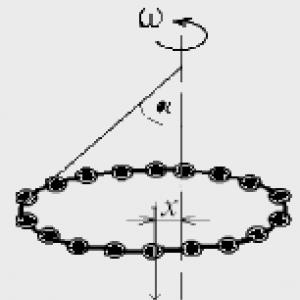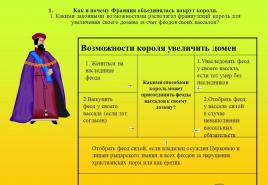Spelling minimum of stress. Some orthoepy rules
The greatest excitement for high school graduates is the exams in uSE form... Indeed, depending on what the results will be, admission to the desired university may depend. And what is even more important for many parents of eleventh graders is the ability to educate their children on a budget, not commerce. One of the compulsory exams is the Russian language, preparation for which can provide a "safety cushion" for the final score of all examinations taken together. What can help in successful passing the exam In Russian? Spelling dictionary for the exam-2019. FIPI has posted it on its official website to facilitate preparation for this topic.
What is orthoepy?
Orthoepy is a section of the science of language, where emphasis is studied in particular.
The French do not need to bother in this regard, since in their language everything is extremely simple - the stress is constant, on the last syllable. But in Russian, the stress is mobile. It can fall on different parts of the word:
- on a prefix (nowhere);
- root (garbage chute);
- suffix (pamper);
- ending (removedA).
In addition, different parts of a word of the same part of speech and in the same form can be in a strong position. For example: in verbs of the feminine singular, as a rule, the stress falls on the ending (sleepA, tookA, tookA). But in the words of krAla, krAla, she sent the stress “runs away” from the ending to the root.
What is the difficulty of the spelling task?
Often from students when studying the topic "Orthoepy" you can hear the following phrases: "Well, why is it so correct?" After all, everyone speaks differently! "
The difficulty of comprehending the rules for setting stress lies in the fact that children from the people around them constantly hear incorrect sounding words. Remember how often you hear, for example, "teftels", "wednesdays", "cakes" or "witchcraft"? But this is the literary pronunciation norm.
Therefore, this must be taken seriously and taught aloud the words with the correct stress.
Task number 4 on the exam in Russian
It is under this number that a graduate will find a task for an accentological norm.
Its wording in the 2019 test and measurement materials is as follows.
One of the words below contains a production error.
emphasis: WRONG highlighted letter for stressed vowel sound.
Write this word down.
- disconnected
- Adolescence
- chauffeur
- Wholesale
- nEWS
Correct answer: wholesale.

Some orthoepy rules
To facilitate the preparation for assignment number 4 on the Unified State Exam in the Russian language, graduates need to learn some rules of spelling.
| Orthoepy rule | Examples of |
| Many feminine singular past tense verbs have a stressed ending. | lied, started, locked up Exceptions: klala, krAla, sent |
| In some short adjectives and the feminine participles also emphasize the ending | slim, right, locked, started |
| In a group of words with the root - accent - stress falls on this root | water pipe, garbage pipe, gas pipe. But the electric wire |
| In words with the root -bal-, the stress on this root does not fall | pamper, pampered, balUet An exception is the word baloven |
| In these verbs, the stress should be at the end. | turn it on, turn it on, turn it on |
| In words ending in -log, the stress falls, as a rule, on the last syllable: | dialOg, katalOg, monolOg, necrolOg |
| In words denoting measures of length and ending in -meter, the stress falls on the last syllable: | kilometer, centimeter, millimeter, decimeter |
| In some nouns, the stress is fixed and remains at the root in all cases: | aIRPORTS - AIRPORTS bant - bant - with bant book-alter - book-alter X - with X - X - X krAn - krAny lecturer - lecturers - lecturers cake - with cake - cake - cake scarf - scarf - scarf - scarf |
| In some adjectives, the stress is the same as in the original nouns from which they are formed: | lAYER - LAYER kitchen - kitchen sorrel - sorrel |
| In verbs ending in -IT, when conjugated, the stress falls on the endings: -ISH, -IT, -IM, -ITE, -AT / -ЯТ: | turn on - turn on, turn on, turn on, turn on, turn on hand over - hand over, hand over, hand over, hand over, hand over Call - call, call, call, call, call, call bleed - bleed, bleed, bleed, bleed, bleed. |
| Verbs are conjugated in the same way: | call, exclude, endow, tilt, mess, call, facilitate, encourage, cheer up, lend, surround, repeat, call back, call, drill, strengthen, pinch. |
| The following verbs ending in -YIT do NOT stress the ending: | poll - poll freshen up - freshen up |
| In verbs formed from adjectives, the stress most often falls on -IT: BUT: the verb to embitter, formed from the adjective evil, does not obey this rule. |
fast - to speed up, sharp - to sharpen, light - to lighten, vigorous - to encourage, deep - to deepen |
| In reflexive verbs, the stress in the past tense often goes to an ending or suffix (in masculine past tense verbs): | to begin - began, began, began, began, began Accepted - Accepted, Accepted, Accepted, Accepted, Accepted |
| The gerunds are often stressed on the same syllable as in the infinitive of the verb from which they are formed: | aSK - ASKING, FILLING - FILLING, TAKING - TAKING, START - STARTING, RAISING - RAISING, TAKING - ATTENDING, CREATE - CREATE |
| In gerunds with the suffix -ВШ-, -ВШ-, the stress falls on the vowel that stands in the word before these suffixes :. | starting, giving, raising, arriving, starting |
| On the prefix DO- stress falls in the following adverbs: | to the top, to the bottom, to the dry. BUT: WHITE, DOLLZA |
| On the prefix ZA- stress falls in the words: | dawn, dusk, dawn. BUT: envy is envious |
How to prepare for an orthoepy assignment?
To learn the correct formulation of stress in words, you need to practice. How to do it:
- download the orthoepic dictionary on the FIPI website;
- be sure to pronounce difficult words out loud;
- you can learn words alphabetically: https://studfiles.net/preview/1843174/
- or by parts of speech.
Here you can watch a video on the topic “. Task 4. Theory and practice. Accents ":
Adjectives
Verbs
take-take sHOOT-SHOOT take-take take it turn on-turn on turn on, turn on iN-IN-IN break in-break in perceive-perceived recreate-recreate hand over chase-chase chase-chased kind-kind get it-got it wait-wait dial-call will call dose wait-waited live-live seal up borrowed, borrowed occupied, occupied lOCK-LOCKED call-call call, call, call, exhaust cLASS-CLALA hiding - hiding lie-lie pour-lilA pouring-pouring lie-lie endow-endow overstrain-overstrain name-named roll-roll pour-pour nARVAT-NARWAL shit-shit start, start, start, start | call-call make it easier doused-doused hug-hugged overtake-overtook cheer up-skinned encourage cheer up-cheer up sharpen lend-lend to anger surround-surround reward ... send refresh-refresh depart-depart give-give bet-open revoke-recalled recall-recalled call back - call back overflow-overflow fruit repeat-Repeat call-call call-call-call-call wATER-WATER put-put understand-understand sEND-SEND compel tear-tear dRILL-DRILL-DRILL-DRILL take off cREATE-CREATE pluck-plucked sort-sort rEMOVE-REMOVE accelerate deepen strengthen-strengthen pinch-pinch, pinch Communion
|
As an English tutor, I have been working for many years and prepare my students for both entrance and final exams. I can say that any exam is a serious test for the applicant, and the USE in English is one of the most difficult exams in a secondary school. After all, this is not only the final, but also the entrance exam to the institute! Therefore, the preparation should be approached with all responsibility.
In order to pass the USE in English for a high score (84-100), you must have a level of knowledge not lower than upper-intermediate. It is at this level that you need to be guided if your goal is to enter the leading universities in Moscow.
Literature to prepare for a unified state exam released a lot. Basically, these are tutorials with a set of approximate options for the exam in English language. Such aids are very useful at the last stage of learning, when the child has already formed a certain grammatical, lexical and conversational level, many topics of the program have been studied, and the teacher's goal now remains to orient the student to a new form of testing. An experienced teacher understands perfectly well that without the formation of a solid theoretical foundation based on knowledge of various competencies, no coaching will help in choosing the right answer. For this purpose, there are various textbooks by both domestic and foreign authors. Both have their pros and cons. Therefore, in choosing textbooks, I always try to use those tasks that are most useful in teaching a particular child and can give the best result. Do not forget that any experienced tutor will refer to their own teaching aids, development and ideas.
Listening is a type of speech activity that causes the greatest number of difficulties not only for those who begin to learn a language or prepare for various types of exams, but also for those who find themselves in a foreign language environment and are forced to take independent decisions... First you need to answer the following questions:
1) What is listening and how is it different from listening?
2) Why does this type of speech activity cause the greatest number of difficulties?
3) How is listening training related to the formation of related language and speech skills?
First, listening Listening Comprehension is the process of comprehending and understanding speech by ear. Teaching students to understand speech by ear is one of the most important goals of teaching English. In situations of real communication, we are faced with listening as a completely independent type of speech activity. Often, in addition to listening to speech, we perform other actions: observing, talking, writing. Any audio recording provides information for discussion, which, in turn, implies the further development of speaking skills. Therefore, listening is a learning tool. It is simply impossible to draw a clear line between listening and speaking in this case. Even the term "speaking" initially implies listening skills.
Secondly, listening difficulties include:
A) difficulties caused by listening conditions (external noise, recording quality, poor acoustics)
B) difficulties due to individual characteristics source of speech (lack of practice of listening to speech of people of the opposite sex, different ages, peculiarities of diction, tempo, pause)
Thirdly, psychologists note that during listening, internal pronunciation of speech occurs. The clearer the pronunciation, the higher the listening level. Anyone who has a habit of internally speaking, recording information will better understand and remember it. Perception test english speech by ear, is perhaps one of the main problems. The reason is not only that audio cassettes are not listened to throughout school course (and this is 11 years), but also in the fact that the students do not know how to correlate keywords in questions and audio recordings and choose the answer options only because the same words sound in the texts, and forget that the correct answer is usually expressed synonymously. Plus, on any exam, a limited time is allocated for the task. Throw in the natural excitement of the exam, and the exam does worse than it could.
Reading, from my point of view, is the section that causes the greatest difficulties for applicants. Even if the student knows the format of the assignments, one should not forget that the texts for testing are provided authentic, and those who do not have a good lexical and grammatical base will not be able to show linguistic intuition, since the assignments are formulated in such a way that the use of a synonymous row can confuse the child with confused. A limited amount of time is allocated for the English exam, and the children simply do not have time, they are in a hurry, plus anxiety - and again unwanted mistakes. Therefore, in my lessons, I pay special attention to the study of authentic texts of various topics and complexity, which will certainly lead to an improvement in listening, speaking and writing skills. Artistic, classical, english literature, suggested for listening and subsequent discussion, encourages children to self-study works.
Grammar and vocabulary is not the problem of one or two students, but the trouble of 90% of all who decided to take the USE in English. In lexical tasks, synonymous rows are able to confuse strong students. Therefore, special attention is paid to the knowledge of the spelling rules and the skills of their application on the basis of the studied lexical and grammatical material, on the idea of \u200b\u200bsynonymy, antonymy, lexical compatibility, polysemy, further expansion of the scope of meanings of grammatical means studied earlier, and familiarity with new grammatical phenomena, for compliance existing in english language norms of lexical compatibility; I teach to find and form related words using the basic methods of word formation, to recognize the belonging of words to parts of speech according to certain characteristics (articles, affixes, etc.);
Written assignments. This includes writing a 140 word personal letter, and writing an essay on a given topic expressing your point of view (200-250 words). In this type of assignment, it is important to maintain a strict structure, using arguments to prove your point. It is not easy to come up with arguments and often it takes a lot of time to analyze the topic, the essay has to be rewritten, and everyone understands that the more the student understands, the more chances he has to get the highest score.
Speaking is inextricably linked with culturological competence, the meaning of which lies in the creative assimilation and comprehension of everything valuable both in the culture of one's own people and in other cultures. High level only an insignificant part of students has cultural competence. Others are characterized by a low and medium level of this competence. Consequently, it is necessary to organize special work on the formation of cultural education in the learning process, namely, in the process of learning a foreign language. To form this competence, it is necessary to organize a special activity that would allow one to focus on the relationship between culture, education and communication. The oral exam in English (as well as the written one) has its own structure. Therefore, to successfully pass this type of testing (20 out of 20), you should follow it. Of course, for those who have a fluent speaking skill, this task is much easier to cope with.
It should be noted that the most important task of the FSES (federal state educational standard) is the formation of universal (metasubject) educational actions that provide schoolchildren mastering foreign language, ability to learn, ability to independent work over the language, and, consequently, the ability for self-development and self-improvement. Therefore, the most important task for any teacher should be to develop student motivation and self-confidence.
Today the concepts of "metasubject", "metasubject training" are gaining special popularity. This is quite understandable, because the metasubject approach is the basis for new standards.
Kuznetsova Tatiana Vladimirovna, English tutor
Deal With Your Fears: 5 Ways to Stop Preexam Fear from Ruining Your Life
Turn your fears into your wisdom
We all have both positive and negative experiences. This is natural, but often we fail in dealing with negative experiences - mistakes that hurt us - and they haunt us and keep us from being happy. We are afraid to make mistakes again, and this does not give us the opportunity to enjoy life and therefore we are in constant stress. To achieve happiness, reduce stress, and move forward towards dreams, you need to combat these fears. One of the worst fears we have to deal with is the constant expectation of failure. When we cannot free ourselves from the negativity that the future can bring to us, we allow it into today's life. By clinging to our fear, we limit our potential and our future. The correct perception and the ability to realize what is bothering us, including in relationships with people, allows us to learn valuable lessons that help to avoid serious mistakes in the future. If we are able to overcome the mistakes of the past and forget about them, then we become more resilient to stress and the vicissitudes of fate and realize that we can cope with them. But sometimes we are not fully aware of what worries us. Surprisingly, fears can also have a beneficial effect on us, forcing us to change, to look at life in a new way and more constructively. The ability to conquer fears makes us stronger and more resistant to ups and downs. Successful struggle with fears in ourselves determines our ability to be happy, improve ourselves and use everything that life gives us. Here's how you can do it.
1. Be able to pinpoint the cause of your fear.
Before you can fight your inner fears, you need to see them. Do not say endlessly that you cannot cope with the problem, enter into games with your subconscious, become discouraged and irritate others. Take time for yourself, stay alone with yourself and find the objective reason for your fear.
2. Show objectivity.
Having named the reason for your fear, move on to a more objective plane, try to think more rationally. Ask yourself what exactly triggered the experience.
3. Look into perspective.
Remind yourself that failure, pain, frustration, and other negative feelings are part of life. But you are strong enough not to let your anxiety make you hostage to the situation. Think about the future development of your problems. What happens if you win? Or what if you lose?
4. Get started developing your small business plan.
It is often difficult for us to do this because we do not have such experience. But think about what we have to lose? Some of your time and a couple of pieces of paper? Take a notebook. Write what problem you have, with an arrow to the left indicate the reason, with an arrow or several to the right, indicate ideas for overcoming the obstacle, which we call fear. If you are out of ideas, you can ask your parents or teachers for advice. You, of course, have friends who are also experiencing these same problems. It's always easier to act together.
5. We start to act.
When we constantly "cling" to anxiety, we limit our own possibilities, as we avoid risks and new beginnings because of fears. We think in terms of “I can't”, “I shouldn't”, “I won't succeed”. But the opposite is necessary. You have a clear understanding of your problem and you know how to overcome it. Go ahead and don't forget: you have your own business plan and its implementation depends only on you.
In one of the words below, a mistake was made in the formulation of stress: the letter denoting a stressed vowel sound is incorrectly highlighted. Write this word down.
locked
Explanation (see also Rule below).
Let's place the stress correctly:
locked
We see a mistake in the word "locked", it is correct to say locked. In response, write out the word without correcting it.
Answer: locked.
How not to lose point for this task?
The editorial board receives dozens of questions about this task, which was met in the 2015 USE. It was proposed in the specified wording. Anyone who does not read the task carefully will lose points. In response, you need to enter the word in which the mistake was made. There is no need to fix this error. Therefore, in response, you must write down the word locked. In the USE forms there is the letter E, it must be used. If you write locked, the task will not be credited to you.
Answer: locked
Source: Unified State Exam - 2015. Early wave
Rule: Staging stress. Task 4.
ORPHOEPIC STANDARDS (stress setting) are checked in task 4.
Students are required to write out one of four words in which the stress is incorrectly highlighted - the stressed vowel is indicated by a capital letter. In the answer, the word is entered without changes, without highlighting in capital letters. Pay attention to the letter E: if the misspelled word contained this letter, it must be written in the answer as well. For example, from four words:
locked
the first has misplaced stress. We write out this word in response without change, with the letter E. We draw your attention to the fact that the question of the possible spelling of E instead of E is solved simply: in front of each examinee on the exam there will be a form in which ALL allowed letters and signs are indicated. At the moment, there is a letter E in the sample forms.
For training in the skill of staging the stress, RESHUEEGE offers both words from the Orthoepic minimum of FIPI (2016), and words that have not entered or left it.
In tasks with an increased level of difficulty, along with words with a clearly erroneous stress, words with two variants of stress are included.
Orthoepic Dictionary FIPI 2016
An important aspect of orthoepy is stress, that is, the sound selection of one of the syllables of a word. The stress on the letter is usually not indicated, although in some cases (when teaching Russian to non-Russians) it is customary to put it.
Distinctive features of Russian stress are its diversity and mobility. The diversity lies in the fact that the stress in Russian can be on any syllable of the word (book, signature - on the first syllable; lantern, underground - on the second; hurricane, orthoepy - on the third, etc.) .d.). In some words, the stress is fixed on a certain syllable and does not move during the formation of grammatical forms, in others it changes its place (compare: TONNA - TONS and WALL - WALL - WALLS and WALLS). The last example demonstrates the fluidity of Russian stress. This is the objective difficulty of assimilating accent norms. “However, - as K.S. Gorbachevich, - if the diversity and mobility of the Russian stress creates some difficulties in its assimilation, then these inconveniences are completely atoned for by the opportunity to distinguish the meaning of words with the help of the place of stress (flour is flour, tricky is cowardly, immersed on a platform - immersed in water) and even functional and stylistic fixation of accent variants (bay leaf, but in botany: the laurel family).
Particularly important in this regard is the role of stress as a way of expressing grammatical meanings and overcoming the homonymy of word forms ”. As established by scientists, most of the words of the Russian language (about 96%) are distinguished by a fixed stress. However, the remaining 4% are the most commonly used words that make up the basic, frequent vocabulary of the language.
Here are some spelling rules in the area of \u200b\u200bstress, which will help prevent corresponding errors.
Nouns
| airports, stationary stress on the 4th syllable bANTS, motionless. stress on the 1st syllable. borod, vin.p., only in this form singular. stress on the 1st syllable bukhgAlterov, genus ov.mn.ch., fixed stress on the 2nd syllable creed, from faith to confess citizenship cheapness dispensary, the word comes from the English. lang. through the French language, where the blow. always on the last syllable agreement document blinds AND, from French. lang. where the blow. always on the last syllable eminence, from adj. significant Iksy, them. plural, fixed stress catalog, in a row with the words dialOg, monolOg, necrolOg, etc. quarter, from it. lang., where the stress is on the 2nd syllable kilometer, in line with words centimeters, decimeters, millimeters ... cones, cones, immobile. stress on the 1st syllable in all cases in singular. and many others h. cRANES, motionless. stress on the 1st syllable flint, flint, blow. in all forms on the last syllable, as in the word fire lecturers, lecturers, see word bow (s) localities, genus p.mn.ch., on a par with the word form of honors, jaws ..., but news | garbage pipe, in the same row with the words gas pipeline, oil pipeline, water pipeline intention necrolOg, see catalog hatred nEWS, NEWS, BUT: SEE LOCATIONS but it is, but it is motionless. stress in all singular forms. Adolescence, from Adolescent to adolescent pARTNER FROM FR. lang. where the blow. always on the last syllable portfolio dowry calling, in a row with the words calling, recalling (ambassador), calling, but: Feedback (for publication) orphans, n.p.mn.ch., accent in all plural forms. only on the 2nd syllable sredstva, named after p.mn.ch. convocation, see Convocation stolYar, along with the words malYar, doYar, shkolYar ... cakes, cakes scarves, see bows chauffeur, along with the words kioskier, controller ... expert, from French. lang., where the stress is always on the last syllable |
Adjectives
In full forms of adjectives, only fixed stress on the base or on the ending is possible. The variability of these two types for the same word forms is explained, as a rule, by a pragmatic factor associated with the distinction between little used or bookish adjectives and frequency adjectives, stylistically neutral or even reduced. Indeed, uncommon and bookish words often have an emphasis on the base, and frequent, stylistically neutral or reduced words on the ending.
The degree of mastery of the word is manifested in the variants of the place of stress: circle and circle, spare and spare, near-earth and near-earth, minus and minus, clean and clean. Such words are not included in the USE tasks, since both options are considered correct.
Nevertheless, the choice of the place of stress causes difficulties most often in short forms of adjectives. Meanwhile, there is a fairly consistent norm, according to which the stressed syllable of the full form of a number of common adjectives remains stressed and in a short form: beautiful - beautiful - beautiful - beautiful - beautiful; inconceivable - inconceivable - inconceivable - inconceivable - inconceivable, etc.
The number of adjectives with movable stress in the Russian language is small, but they are often used in speech, and therefore the stress norms in them need comments.
The stress often falls on the base in the plural, as well as in the singular in the masculine and neuter gender, and on the feminine ending: right - right - right - right - right - right; gray - gray - gray - gray - sulfur; STRONG - STRONG - STRONG - STRONG - STRONG.
Such adjectives, as a rule, have monosyllabic stems without suffixes or with the simplest suffixes (-к-, -н-). However, one way or another, it becomes necessary to refer to the orthoepic dictionary, since a number of words "knock out" of the specified norm. You can, for example, say: long and long, fresh and fresh, full and full, etc.
It should also be said about the pronunciation of adjectives in the comparative degree. There is such a norm: if the stress in the short form of the feminine gender falls on the ending, then in a comparative degree it will be on the suffix of it: strong - stronger, sick - sicker, alive - alive, slim - slim, right - right; if the emphasis in the feminine gender is on the basis, then in a comparative degree it is preserved on the basis: beautiful - more beautiful, sad - more sad, opposite - more opposite. The same goes for the superlative form.
Verbs
One of the most stressed points of stress in common verbs is the past tense. The accent in the past tense usually falls on the same syllable as in the infinitive: sit - sit, moan - moan, hide - hide, start - start. At the same time, the group of common verbs (about 300) obeys a different rule: the stress in the feminine gender goes to the ending, and in the other forms it remains on the stem. These are the verbs take, be, take, twist, lie, drive, give, wait, live, call, lie, pour, drink, tear, etc. It is recommended to say: live - lived - lived - lived - lived; wait - waited - waited - waited - waited; pour - lil - lilo - lil - lilA. Derivative verbs are pronounced in the same way (live, take, drink, spill, etc.).
The exception is words with the prefix you-, which accepts an emphasis on itself: vyzhit - vyzhila, vylit - vylila, vyzvat - invoked.
For the verbs to put, steal, send, send the stress in the feminine form of the past tense remains on the basis of: sent, sent, stlAla.
And one more pattern. Quite often, in reflexive verbs (in comparison with non-reflexive verbs), the stress in the form of the past tense passes to the ending: begin - began, began, began, began, began; Accepted - Accepted, Accepted, Accepted, Accepted.
About the pronunciation of the verb, call in the conjugated form. Orthoepic dictionaries of recent times quite reasonably continue to recommend the stress on the ending: you call, call, call, call, call. This
the tradition is based on classical literature (primarily poetry), the speech practice of authoritative native speakers.
| pamper, along with the words pamper, spoil, spoil ... but: the balloon of fate take-take sHOOT-SHOOT take-take take it turn on-turn on turn on, turn on iN-IN-IN break in-break in perceive-perceived recreate-recreate hand over chase-chase chase-chased kind-kind get it-got it wait-wait dial-call will call dose wait-waited live-live seal up borrowed, borrowed occupied, occupied lOCK-LOCKED lock-locked (with a key, lock, etc.) call-call call, call, call, exhaust cLASS-CLALA hiding - hiding lie-lie pour-lilA pouring-pouring lie-lie endow-endow overstrain-overstrain name-named roll-roll pour-pour nARVAT-NARWAL shit-shit start, start, start, start | call-call make it easier doused-doused hug-hugged overtake-overtook cheer up-skinned encourage cheer up-cheer up sharpen lend-lend to anger surround-surround to seal, along with the words to form, normalize, sort, reward ... send refresh-refresh depart-depart give-give bet-open revoke-recalled recall-recalled call back - call back overflow-overflow fruit repeat-Repeat call-call call-call-call-call wATER-WATER put-put understand-understand sEND-SEND arrive-arrived-arrived take-take-take-take compel tear-tear dRILL-DRILL-DRILL-DRILL take off cREATE-CREATE pluck-plucked sort-sort rEMOVE-REMOVE accelerate deepen strengthen-strengthen pinch-pinch, pinch Stress in participles and participlesThe most frequent fluctuations in stress are recorded when pronouncing short passive participles. If the stress in full form is on the suffix -YONN-, then it remains on it only in the masculine form, in other forms it goes to the ending: conducted - carried out, carried out, carried out, carried out; imported - imported, imported, imported, imported. However, it is sometimes difficult for native speakers to choose the correct place of stress and in full. They say: "introduced" instead of imported, "translated" instead of translated, etc. In such cases, it is worthwhile to refer to the dictionary more often, gradually practicing the correct pronunciation. A few notes on the pronunciation of full participles with the -T- suffix. If the suffixes of an indefinite form o-, -nu- have stress on themselves, then in the participles it will go one syllable forward: weasel - full, prick - chipped, bend - bent, wrap - wrapped. Passive participles from the verbs pour and drink (with the suffix -t-) are characterized by an unstable stress. You can say: spilled and spilled, spilled and spilled, spilled (only!), Spilled and spilled, spilled and spilled; Doped and drank, doped and doped, doped and doped, doped and doped, doped and doped. Communion
|
To task number 4 "Orthoepic norms"
Rules for placing stress in nouns.
1. Words of foreign language origin, as a rule, in the Russian language they retain the place of stress that they had in the source language. In English, stress most often has stress on the first syllable, and in French, on the last.
Therefore, English borrowings sound like this:
gENESIS, MARKETING, MANAGEMENT, PORTER;
and French like this:
engraver, dispensary, blinds, rubber, party, music stand, chassis.
2. In words denoting measures of length and ending in -meter, the stress falls on the last syllable:
kilometer, centimeter, millimeter, decimeter.
3. In compound words with the second part -the wire with the general meaning "device for transporting any substance or energy", the stress falls on the root -water-
:
petrol line, water line, garbage line, light line.
BUT: electric conduit, electric actuator.
4. In words ending in -log, the stress falls, as a rule, on the last syllable: dialOg, katalOg, monolOg, necrolOg.
5.In verbal nouns the place of stress is preserved, which is in the original verb from which they are formed:
(faith) confess - creed
PROVIDE - provision.
6. In some nouns, the stress is fixed and remains at the root in all cases:
aIRPORTS - AIRPORTS
bant - bant - with bant
book-alter - book-alter
X - with X - X - X
krAn - krAny
lecturer - lecturers - lecturers
cake - with cake - cakes - cakes
scarf - scarf - scarves - scarves.
7. In the noun baloven the stress falls on the root. In all words formed from this word, the stress on -BAL- DOES NOT fall:
pampered, pampered, pampered, pampered, pampered, pampered.
Stress rules for adjectives.
1. In some adjectives the stress is the same as in the original nouns from which they are derived:
lAYER - LAYER
kitchen - kitchen
sorrel - sorrel.
2. The stressed syllable of the full form of some adjectives remains percussion and in short form:
beautiful - beautiful - beautiful - beautiful - beautiful
inconceivable - inconceivable - inconceivable - inconceivable - inconceivable.
3. In some frequency adjectives with a movable stress, it falls on the root in its full form - in a singular and plural; and also in short - in the masculine and neuter gender. In the short feminine form, the stress goes to the ending:
rIGHT - RIGHT - RIGHT - RIGHT - RIGHT
STRONG - STRONG - STRONG - STRONG - STRONG.
4. If the stress in the short form of the feminine gender falls on the ending, then in the comparative form it will be on the suffix -E- or- HER-:
sick - sicker, strong - stronger, slim - slimmer.
If the stress in the feminine gender is on the basis, then in a comparative degree it remains there:
beautiful is more beautiful, sad is more sad.
Rules for setting stress in verbs.
1. Stress in past tense verbs usually falls on the same syllable as the infinitive:
hum - hum, hum
hide - hid, hid.
2. In the other group of verbs, the stress in all forms is fixed, and in the feminine past tense goes to the ending:
brAt - brAl, took, brAlo, brAli
to lie - lied, lied, lied, lied.
took, took, poured in, rushed in, took in, recreated, drove, chased, got, got, waited, waited, borrowed, locked, locked, called, called, called, lil, poured, started, lied, doused, hugged, overtook, tore offA, departed, gaveA, recalled, recalled, poured, called, poured, poured, understoodA, arrivedA, tore, took off, createdA, rippedA, removedA.
3. For verbs put, steal, sneak, send, send, send
accent in the form feminine past tense DOES NOT fall at the end, but remains based on:
krAla, krAla, hid, sent, sent, sent away.
The exception is verbs with shock attachment VY-, which always drags the stress:
lila - vylila, krala - vykrala.
4.In verbs ending in -IT, when conjugated, the stress falls on the endings: -ISH, -IT, -IM, -IT, -AT / -YAT:
turn on - turn on, turn on, turn on, turn on, turn on
hand over - hand over, hand over, hand over, hand over, hand over
call - call, call, call, call, call, call
bleed - bleed, bleed, bleed, bleed, bleed.
Verbs are conjugated in the same way:
call, exclude, endow, tilt, mess, call, facilitate, encourage, cheer up, lend, surround, repeat, call back, call, drill, strengthen, pinch.
5. In the following verbs ending in -IT, the accent does NOT fall on the ending:
poll - poll
freshen up - freshen up.
6. In verbs, derived from adjectives, the stress most often falls on -IT:
fast - to speed up, sharp - to sharpen, light - to lighten, vigorous - to encourage, deep - to deepen.
BUT: verb to anger, formed from the adjective evil, does not obey this rule.
7.In reflexive verbs the stress in the past tense often goes to an ending or suffix (in masculine past tense verbs):
begin - began, began, began, began, began
Accepted - Accepted, Accepted, Accepted, Accepted.
Rules for stating participles.
1. In valid past participles with suffix -VSh- the stress, as a rule, falls on the same vowel that is in the word before this suffix:
live lice ui, pour lice oh, look lice uh.
2. In the passive past participles formed from verbs bend, bend, bend
the accent falls on the prefix:
curved, curved, curved.
3. In short feminine passive past participles the stress falls on the ending:
busy, locked, populated, acquired, poured, encouraged, removed, created by A.
4. If the full accent falls on the suffix -YONN-
, then in a short form it remains only in the masculine gender, and in other forms it goes to the ending:
on - on, onA, onO, on
Delivered - Delivered, Delivered, Delivered, Delivered
populated - populated, populated, populated, populated.
The participles change in the same way:
endowed, brought down, encouraged, disconnected, repeated, divided, tamed.
5. IN full forms participles with suffix -T-
formed from verbs with suffixes -ABOUT- and -WELL- in the infinitive, the stress falls one syllable forward:
polo - polo t th, prick - kOLO t oh, to bend - to fire t oh, wrap it up - wrap it up t th.
Rules for setting stress in gerunds.
1. The gerunds are often stressed on the same syllable as in the infinitive of the verb from which they are formed:
aSK - ASK, fill - fill, borrow - borrow, start - start, lift - lift, undertake - undertake, create - create.
2. In gerunds with a suffix -VSH-, -VSHI- the stress falls on the vowel that stands in front of these suffixes in the word:
start in , give in , raising in , arrivals in , beginning lice smiling.
Rules for setting stress in adverbs.
1. On the console BEFORE- stress falls in the following adverbs:
to the top, to the bottom, to the dry.
BUT: wHITE, DONELZA.
2. On the console PER- the stress falls in the words:
dawn, dusk, dawn.
BUT: to envy is envious.







